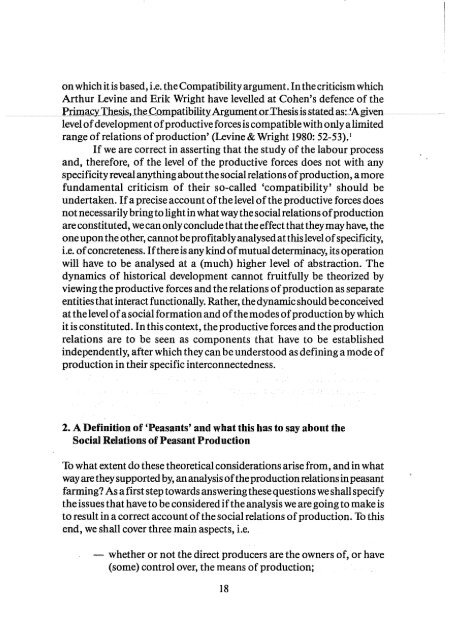Create successful ePaper yourself
Turn your PDF publications into a flip-book with our unique Google optimized e-Paper software.
on which itis based, i.e. the Compatibility argument. In the criticism which<br />
Arthur Levine and Erik Wright have levelled at Cohen's defence of the<br />
Primacy Ib~sis, the CQmpatibilityArgumentorThesis is stated as:-'Agiven<br />
level of development of productive forces is compatible with only a limited<br />
range of relations of production' (Levine & Wright 1980: 52-53).1<br />
If we are correct in asserting that the study of the labour process<br />
and, therefore, of the level of the productive forces does not with any<br />
specificity reveal anything about the social relations of production, a more<br />
fundamental criticism of their so-called 'compatibility' should be<br />
undertaken. If a precise account ofthe level of the productive forces does<br />
not necessarily bring to light in what way the social relations of product ion<br />
are constituted, we can only conclude that the effect that they may have, the<br />
one upon the other, cannot be profitably analysed at this level of specificity,<br />
i.e. of concreteness. If there is any kind of mutual determinacy, its operation<br />
will have to be analysed at a (much) higher level of abstraction. The<br />
dynamics of historical development cannot fruitfully be theorized by<br />
viewing the productive forces and the relations of production as separate<br />
entities that interact functionally. Rather, the dynamic should be conceived<br />
at the level of a social formation and of the modes of production by which<br />
it is constituted. In this context, the productive forces and the production<br />
relations are to be seen as components that have to be established<br />
independently, after which they can be understood as defining a mode of<br />
production in their specific interconnectedness.<br />
2. A Definition of 'Peasants' and what this has to say about the<br />
Social Relations of Peasant Prod uction<br />
To what extent do these theoretical considerations arise from, and in what<br />
way are they supported by, an analysis of the production relations in peasant<br />
farming? As a first step towards answering these questions we shall specify<br />
the issues that have to be considered if the analysis we are going to make is<br />
to result in a correct account ofthe social relations of production. To this<br />
end, we shall cover three main aspects, i.e.<br />
- whether or not the direct producers are the owners of, or have<br />
(some) control over, the means of production;<br />
18
















